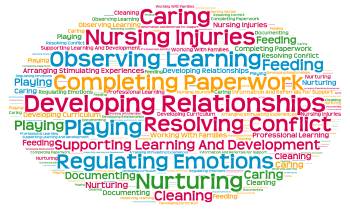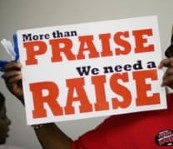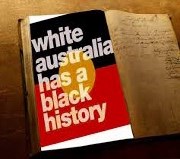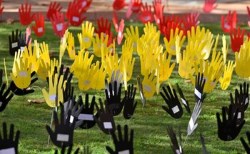In praise of early childhood educators
January 17th, 2019 | Published in Education, Favorites
Preamble for non-educators
Firstly, some questions for those of us who are NOT early childhood educators.
- Have you ever looked after four or five children, younger than three
 years, for up to eight hours a day, five days a week? Or, ten or eleven slightly older children, more than three years but still preschool?
years, for up to eight hours a day, five days a week? Or, ten or eleven slightly older children, more than three years but still preschool? - How did you find that (or, how would you find it, do you think, if you haven’t actually done it)? You could probably expect some special and memorable moments. But, how would you go with the lifting and changing and nose-wiping and feeding and sleeping and soothing? Keeping track of clothes, hats, shoes, bottles, dummies, bags, and special possessions? Getting around at floor level, or being constantly on your feet and always on full alert? Keeping everyone safe and occupied and as happy as possible? Watching out for biting, pinching, punching, hair-pulling, hitting, scratching, or snatching? Defusing conflicts before they get out of hand? And, avoiding serious accidents?
- Sound challenging? Demanding? Exhausting? Rewarding? All of that and more? And that’s without mentioning the educational goals that are built in to formal child care.
 Staff ratios at day care centres are roughly as given above (1 staff to 4 or 5 children up to 36 months; 1 staff to 10 or 11 children over 36 months). There’s some variation between states and territories, as set out in the National Quality Framework.
Staff ratios at day care centres are roughly as given above (1 staff to 4 or 5 children up to 36 months; 1 staff to 10 or 11 children over 36 months). There’s some variation between states and territories, as set out in the National Quality Framework.
I admire the staff at the centre my grandchildren attend. I don’t know if our two are extremely lucky. I do know my daughter-in-law visited several centres before settling on the one she did. I think she chose well.
We collect our grandchildren once a week, and occasionally more often if need arises. The ambience of the centre is an intriguing blend of ordered calm and active chaos. Hard to imagine, perhaps, unless you’ve experienced it. We’re usually there for at least half an hour, often longer. Why? Because the children are enjoying themselves and are not ready to leave! That’s got to say something about the skill and patience of staff.

Early childhood educators say they love their work, BUT…
The only aspect I would like to see change is the staff turnover.
Which brings me to pay and conditions. Most educators say they love their work. (How could you survive otherwise?) But, low wages are an obstacle.
“For example,” Queensland academics note, “younger educators discuss their inability to leave home. Partnered educators remain dependent on the income of their spouse or even a former spouse, to cover basic living expenses. Those who don’t have additional financial support live precariously under persistent financial stress which impacts on their emotional well-being.”
Under such circumstances high turnover is not surprising – 37% in metropolitan areas and up to 45% in remote areas. The turnover in Australia is high by international standards.
 The median hourly pay rate for an early childhood educator (in Melbourne) is $23.68, with a range from $19.83 to $28.89. Qualifications make a difference. Early Childhood Teachers have an average annual salary of approximately $57,000, compared to Child Care Workers whose average annual salary is closer to $44,000. Location of the education and care (designated preschool versus daycare centre) also introduces variation.
The median hourly pay rate for an early childhood educator (in Melbourne) is $23.68, with a range from $19.83 to $28.89. Qualifications make a difference. Early Childhood Teachers have an average annual salary of approximately $57,000, compared to Child Care Workers whose average annual salary is closer to $44,000. Location of the education and care (designated preschool versus daycare centre) also introduces variation.
The work may be rewarding, but it’s also hard – physically, mentally, and emotionally. It’s not well paid, and nor is it valued as it deserves to be.
So, to my letter of appreciation – specifically to the early childhood educators who work at the centre my granddaughters attend, but also with broader acknowledgment of the many doing similarly great work with similarly too little recognition.
In praise of early childhood educators
Over the later part of 2018, I became involved in the RAP (Reconciliation Action Plan) working group at the centre my grandchildren attend. This program, which is being developed in many settings, addresses the relationship between Indigenous and non-Indigenous Australians. It’s particularly important to me, given the lack of education about Australia’s history in my own early years, as discussed later. Some of the aspects I’m aware of include:
- Acknowledgement of country, a ritual the children participate in
 each day;
each day; - Books with Aboriginal and Torres Strait Islander themes;
- The RAP program, as a work-in-progress; and
- General awareness raising around reconciliation and other social issues.
Learning to stand up (or sit down) and speak out
The environment my grandchildren enjoy is, I think, the kind that enables children like nine-year-old Harper Nielson to develop the courage of their convictions.
Remember Harper?
She refused to stand for the national anthem at her primary school assembly because she felt it ignored Aboriginal and Torres Strait Islander people.
Harper’s action unleashed waves of backlash, but she stood firm. She wrote an article about what she did, and here are some extracts:
- I started to feel as if Indigenous Australians were being ignored [in the national anthem].
- I did some research and found some articles that talked about how the anthem’s word “fair” might have meant advancing Australia for the fair-skinned people who came “across the seas” as colonial settlers. That made it seem even worse.
- Standing when they played the song felt like supporting something I
 didn’t believe in.
didn’t believe in. - I was told my behaviour was disrespectful.
- I did not really want to be disruptive or force my views on anyone else.
- Then what I was doing was on the front page of the newspaper.
- I wanted people to think about racism. I’m happy I did what I did. And even with the mean things some people said about me, I’d do it again.
- I also think we should learn more at school about colonisation and Australia’s history, and what it means to different people. We need to understand it for us to be fair to everyone.
Well done, Harper, and those in her life, including educators, who have created a context in which a nine-year-old can think through issues and arrive at an ethical position. Some people, including commenters on my 2020socialjustice Facebook page, insisted on depicting Harper as ‘primed’ or ‘coached’ by her parents.
I think they’re wrong. I think a nine-year-old is capable of developing a position like Harper’s, provided their circumstances allow it. Of course children are influenced by the adults around them, but if Harper was simply following direction from these adults, I don’t believe she would have stood up to the pressure. Nor would she have been able to represent her ideas as she has done. I believe the article is her own work. The ideas are sophisticated, but the lens is a child’s.
I know I would not have been able to ‘coach’ or ‘prime’ my own children to take such a stand if they had not arrived at it themselves. The idea of parents making children do anything implies an authoritarian approach that might be powerful at home but would struggle to withstand a competing authority at school. Such competing directives would create a confused child rather than a clear-headed one like Harper Nielsen.
I would be delighted if my grandchildren grew up like Harper, able to think for themselves and capable of articulating their ideas. If they do, the work of early childhood educators will be an important contributing factor.

Student activism
Also in praise of educators, I want to mention the student rally for action on climate change.
This protest, in December 2018, was sufficiently newsworthy to rate an article in the New York Times. It involved thousands of students across Australia, at primary and secondary levels, making it clear they expected politicians to take immediate action.
As with Harper, there was much backlash, and the politicians were front and centre. Australia’s prime minister of the moment, Scott Morrison, said Australia needed “more learning in schools and less activism”.
Matt Canavan, resources minister, said he wanted kids to be at school to learn how you build a mine, and how you drill for oil and gas. In his view, “the best thing you learn about going to a protest is how to join the dole queue” [!]
According to academics, Kellie Bousfield and Jacquie Tinkler, however, the student action was evidence of an education system working as it should.
 “Far from being concerned about an afternoon off school, parents should feel satisfied schools and teachers are doing their job. Participation in these protests meets many of the key goals of our current education system, including students’ capacity to engage in, and strengthen, democracy.”
“Far from being concerned about an afternoon off school, parents should feel satisfied schools and teachers are doing their job. Participation in these protests meets many of the key goals of our current education system, including students’ capacity to engage in, and strengthen, democracy.”
Educating children to be politically engaged is a strength not a flaw. Engagement presupposes awareness, and such awareness can begin with early childhood education.
My (lack of) early education on social issues
By contrast to Harper Nielsen and the climate activists, I grew up in the 1950s and 60s.
In 1954 less than a third of women aged 15-64 in Australia were employed. Of that number, less than a third were married. That is, less than ten percent of married women were in paid work. Married women were expected to stay home and look after the family. They did all the child care and domestic labour. Their husbands were described as the ‘breadwinners’.
The Women’s Liberation Movement had not yet made its presence felt.
Most children of my era stayed home with their mothers before going to school. We did not have preschool education, and kindergarten was an idea that was still over the horizon. If your mother was not educated, you pretty much missed out. My mother left school when she was 12, after her father died and she was needed by her mother to help look after the family shop, and her four younger siblings.
Education for girls was not highly valued – in my mother’s generation, or mine (although I got my chance after Gough Whitlam abolished tuition fees for tertiary education in 1974).
Our primary school classrooms were overcrowded, highly regimented,  rule-governed, and non-interactive. 50 to 60 children at multiple levels in one room with one teacher was the norm.
rule-governed, and non-interactive. 50 to 60 children at multiple levels in one room with one teacher was the norm.
I was sent to Catholic schools, as per the imperatives of my parents’ religion. These schools were not government funded at the time. They were staffed by nuns, who may or may not have had any formal training.
If you transgressed the ‘rules’, or spoke up for what you believed in, like Harper Nielsen did, corporal punishment was the predictable response. Harper’s stance would have been unthinkable to us as kids. The student strike for climate action would have seemed like something out of a banned book.
I’m not sure how we learnt anything, although I did manage the basics of reading, writing, and arithmetic. We were kept in disturbing ignorance of our social context.
The White Australia Policy (1901 to 1970s) was in place but never mentioned.
Learning about other cultures was not on the curriculum. Our classrooms, neighbourhoods, and churches were monocultural.
We learnt nothing of First Peoples’ history, their stewardship of the land over tens of thousands of years pre-colonisation, the frontier wars, or the  Stolen Generations. The forced removal of children from their families between 1910 and 1970 spanned my first 23 years, but I was ignorant of it happening. The wake-up call of the Bringing them Home report was still more than two decades away.
Stolen Generations. The forced removal of children from their families between 1910 and 1970 spanned my first 23 years, but I was ignorant of it happening. The wake-up call of the Bringing them Home report was still more than two decades away.
No one, in my memory, ever intervened when Catholic kids and Protestant kids traded insults across the road that divided our schools, or when disabled kids were ridiculed and excluded. Some of the ditties were unedifying to say the least.
Australia was a racist, sexist, homophobic, ableist, bigoted society with pockets of dismal poverty. The narrative, however, was about ‘the land of the fair go’.
Television didn’t arrive until 1956, and most of us only saw it through shop windows until much later. There was, of course, no internet, home computers or mobile phones.
My childhood in Australia was insular and shamefully ignorant. I had a vague sense of dis-ease, but nowhere to go with my questions. I didn’t even have the words with which to ask them.
Perhaps you begin to see why I appreciate my granddaughters’ early childhood education.
Learning on the run
I remember being in a meeting with Moira Rayner, human rights lawyer, many years ago. I’d taken along my copy of The Women’s Power Handbook (which she wrote with Joan Kirner, RIP 2015). I wanted to ask Moira to sign it for me. (I already had Joan Kirner’s autograph.)
I said something along the lines that I wished I had known what was in that book when I was a much younger woman.
She said she did too.
 She was saying, in effect, that she had learnt on the run, partly in the process of writing the book. Moira Rayner and Joan Kirner were both women who had been in positions of power (Rayner as equal opportunity commissioner and Kirner as premier of Victoria, among other roles). Their book brought together what they had learnt along the way.
She was saying, in effect, that she had learnt on the run, partly in the process of writing the book. Moira Rayner and Joan Kirner were both women who had been in positions of power (Rayner as equal opportunity commissioner and Kirner as premier of Victoria, among other roles). Their book brought together what they had learnt along the way.
We all, of our generation, had much catch-up to do in so many areas of social justice.
Thanks from a grateful grandmother
This is why I think early childhood education is so important.
My younger granddaughter was less than one year old when I first noticed educational themes. The older one was three.
This is brilliant.
I want educators to know how much I value your work, and how much trial and error and blind alleys you might be helping children like my grandchildren, and their peers, to avoid by opening their minds early to the realities of social context and history.
I hope you keep doing what you do.
I would support any political action to improve your pay and conditions – for your own sakes, and also to increase staff retention. This would surely be good for everyone, including the children, their families, and educators.
At this stage, I want you to know that I value what you offer children, and think it’s something you can be proud of for the rest of your lives.

Thank you, early childhood educators, and staff at day care centres and preschools, from a grateful grandmother
………………………………………………….
Scroll down for COMMENTS
First-time comments have to be moderated
I try to complete that process, and respond, within 24 hours
Do check back
Social justice is for everyone (previously 2020socialjustice) is also on Facebook (click here)
Joan Beckwith on Twitter (click here)
…………………………………………….
NOTE: If you like this post, you might also be interested in browsing the site, perhaps starting with the Favorites category, which brings together a selection of posts from across other main categories.
 years, for up to eight hours a day, five days a week? Or, ten or eleven slightly older children, more than three years but still preschool?
years, for up to eight hours a day, five days a week? Or, ten or eleven slightly older children, more than three years but still preschool? each day;
each day; didn’t believe in.
didn’t believe in.


I taught at the one primary school until I retired 30 years later! In that time I taught a girl who grew up to also be a teacher ! She married and had two children and then came back as a qualified teacher in the same school ! I then taught her son in a composite 3/4 ! We are still the very best of friends !
I was hopeful of hearing some stories like this, Bernadette, about the multi-generational thread that might happen in teaching. It probably occurs more often than teachers would be aware of, which is a shame, as there’s something very satisfying about the continuity.
Thirty years is a long time to teach, so I’m guessing there was something important that held you. Quite likely multiple reasons, including love of teaching, which is fantastic for all concerned, but can also mean putting up with, and being expected to put up with, inadequate pay and conditions ‘for the love of the job’.
I hope you are enjoying an interesting, relaxing, and healthy retirement (and I appreciate your involvement on the FB page as well).
My own experience as an educator was in the TAFE sector, although many of my relatives, including my mother, uncles, sister and cousins, have taught in the primary sector.
And during my years at TAFE, I remember a business leader, in about 2009 I think, recommending that TAFE teacher salaries should be immediately doubled. (Nothing like this has been achieved, or even considered, of course – the undervaluing continues.) I think that this doubling of salaries should apply to all teachers, in all sectors, and to all service sectors. All educators are undervalued and underpaid, as are all those in all the service industries in general, in my opinion.
In terms of understanding the situation with the stance of politicians, and society in general, I think that the Integral ideas of Ken Wilber, whilst not perfect, are quite helpful in understanding where different people are at. Basically, what he says is that all human beings go through various stages of development, and that most seem to get stuck at some point or other along the way. For example, approximately 70% of the world’s population is at the tribal/traditional level – this represents a very narrow, ethnocentric, patriarchal, rigid, rule-based worldview – with this figure being at about 50% in the, so called, first world. With only a very small percentage, about 5-7%, being at the leading edge of higher development.
My point here is that most, if not all, politicians on both sides of politics seem to be stuck at this level (or just above), and, of course, all their prognostications arise out of this very limited worldview. We need leaders in parliament, and in society in general, who have actually grown up into the broader worldviews if things are going to change for the better. But, unfortunately, it looks like this won’t happen for quite some time yet.
It appears that our tortured world may be currently at a transition point, similar to the point at which the Enlightenment in Europe and the West began. And humanity can either regress into chaos, or jump to the next level of development.
All educators, in whatever sector and whatever level, have the awesome possibility of providing a context that promotes work towards that “higher development” you refer to it seems to me, Richard (the concept suggests critical and divergent thinking; respect for scientific problem solving, data and evidence;, emotional intelligence; capacity to stand outside one’s one usual frame of reference etc.; all in short supply among many public-profile politicians). The potential of educators to educate/promote development is exactly why they should be adequately paid and, as you imply, exactly why we need them at this “transition point”. And, if Harper Nielsen and the climate activists are any indication, I think educators are doing their job against the odds and despite being underpaid and undervalued.
Thank you Joan for your kind comments. I am a Kindergarten Teacher of some 36 years experience and value my role in helping set attitudes of fairness, respect and acceptance of all in the young children l teach. Social justice influences much of my program, as well as establishing positive self esteem and resilience in children so they can cope with the life challenges ahead. Add to that the excitement of learning, of discovering, the joy of literature, music and dance and you will see why this has been less of a job for me but a lifes work. I so appreciate your recognition of what l do and yes wish the salary was better, but then again no one who loves this career is in it for the money. If lve helped change the future for one child in a good way, that is my reward.
36 years is an amazing contribution, Deb Parslow, and your framework (social justice/personal development/learning in multiple forms) sounds inspiring. I wonder if you have taught children whose parents you have also taught? It would be incredible, I imagine, for that to happen. Best for many more years to come, and increased recognition at a social level of what is clearly a passion on your part.
Well said. An excellent summation of my own (Catholic) primary school years (1961-1968) and of how much better things are now. The role of the mother in the home was undervalued then, the role of Early Childhood Educators is undervalued now. As a society, we need to value and care for the development of our children, and reward those who work hard to support that development justly.
Thanks for your comments, Vicki. It’s good to come across shared experience, and shared appreciation of the changes.
As a society (if we still can be said to have one, as distinct from an economy) we don’t adequately value work perceived as ‘care-work’, including work with children, and also in aged care, disability etc. This kind of work involves specialist knowledge and skills as well as temperament and empathy. It’s mainly done by women.
The question I have is whether we don’t value the work per se (and yet there’s plenty of lipservice paid) or whether the problem is at least partly that women are still undervalued in general, and hence so is their work. It’s a bit circular and, regardless, there needs to be change in many areas, including early childhood education.
Well said Joan. Perhaps most importantly missing from public awareness in this debate is wages. A qualified ECT ( holding a 4 year B. Ed. Can earn max $57000 in ECE settings. The starting salary for that same person in a school setting is in NSW $68000. In addition, school based hours are 4and a half FTF ( face to face teaching) per day for 200 days p.y. Over 39/40 weeks. In ECE the ftf is double and the year is 48 weeks at 5 days per week.
ECT working in school is considered by Centrelink to be part time work but professional work. Work in the care sector is definitely full time but unprofessional. There is absolutely no growth in wages in the care sector, yet teachers can increase their salaries to in excess of $100000 within six to seven years.
Assistants who work in schools currently have a full time salary equal to top levels of ECT in care wages, and require no quals at all ‘just experience with kids’. Where as assistants in ECE care settings require training that would run rings around school based equivalents. Then, look at hours etc as for ect in school: ie; 40 weeks or 48 weeks.
Holster I am in support we actually need to move to restructuring the whole system so that there is consistency throughout. Otherwise this is never going to end.
Thanks for all this information, Lea Powell, which definitely highlights the anomalies. I started the post just wanting to express my admiration and appreciation for the work I witness first hand at my granddaughters’ centre. That led me a little down the path of realising how poorly paid and inadequately valued the educators are, and also to some awareness of the disparities between daycare settings and kindergartens etc. It seems grossly unfair and, as I note in the post, I would support any action on the part of educators to get change. If you become aware of actions I could promote on my FB page, I would appreciate knowing. You can contact me through this website (Contact page), DM on on the FB page, or by email at 2020socialjustice@gmail.com.